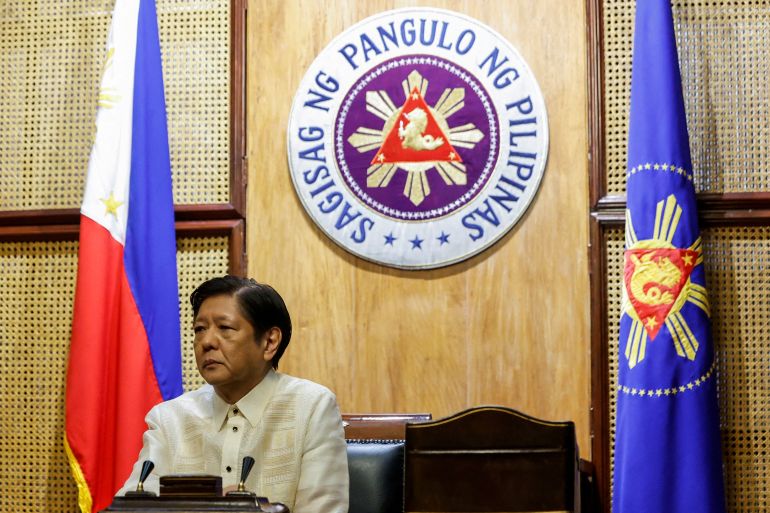Summit with US, Japan aimed at economy, South China Sea cooperation: Marcos
Philippine president departs for Washington, DC to attend first trilateral meeting seen as countering China’s growing geopolitical influence.

Philippine President Ferdinand Marcos Jr has said upcoming talks with his US and Japanese counterparts in Washington, DC will focus on strengthening economic cooperation and include a deal to maintain security and freedom of navigation in the South China Sea.
His comments on Wednesday came before his departure for the United States where President Joe Biden on Thursday will host the first ever trilateral summit with Marcos and Japanese Prime Minister Fumio Kishida.
Keep reading
list of 3 itemsPhilippines summons Beijing envoy over South China Sea water cannon attack
Philippines accuses China of new water cannon attacks in South China Sea
The Philippine president is also set to hold a bilateral meeting with Biden before the meeting of the three leaders.
“The main intent of this trilateral agreement is for us to be able to continue to flourish, to be able to help one another, and of course to keep the peace in the South China Sea and the freedom of navigation,” Marcos said.
He added that the summit will contain “more details in the sense of how cooperation will be implemented” in the South China Sea, which has seen increased naval skirmishes between China and the Philippines in recent years.
Marcos also said he aims to explore ways to advance cooperation with Japan and the US in key areas, including infrastructure, semiconductors, cybersecurity, critical minerals, renewable energy and defence and maritime cooperation.
China has been keeping a wary eye on the summit, which is seen by observers as an effort aimed at countering Beijing’s growing geopolitical influence in the Asia Pacific region.
On Monday, China’s Ministry of Foreign Affairs said it was “opposed to the cobbling together of exclusive small circles and to confrontation between different groups in the region”.
‘Horrified’
The Philippines under Marcos has deepened military ties with the US and Japan as maritime run-ins with China in the South China Sea have escalated.
Marcos has allowed to nearly double the Philippine bases that US soldiers can access, and talks are under way with Japan for a reciprocal access agreement that will allow the presence of Japanese forces on Philippine soil.
At the same time, Marcos has also denied the existence of a so-called “gentleman’s agreement” reportedly struck under predecessor Rodrigo Duterte with Beijing to keep the status quo in the Second Thomas Shoal, a disputed maritime feature in the South China Sea.
Speaking to reporters before his departure, Marcos said he was “horrified” by the alleged deal, adding that it may have “compromised” the sovereignty and sovereign rights of the Philippines.
A former government spokesperson confirmed last month that such an informal agreement was made between Duterte and Chinese President Xi Jinping.
China claims almost the entire South China Sea, overlapping with territorial claims of the Philippines, Vietnam, Malaysia and Brunei.
In 2016, the Permanent Court of Arbitration in The Hague said China’s claims had no legal basis, a decision Beijing has rejected.